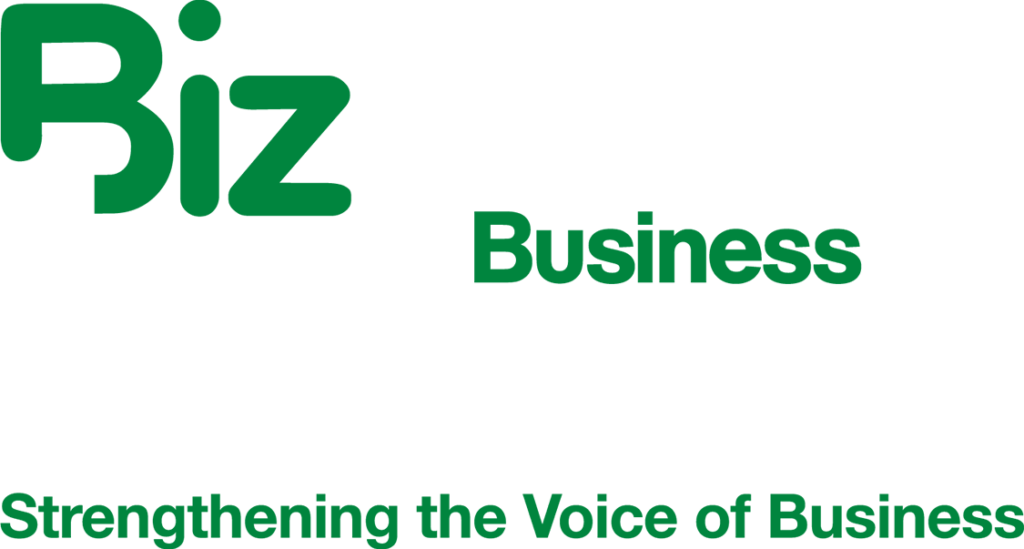September 16, 2024
CONTACT: Clint.olivier@bizfed.org
1 dropped 18% points in the last months of campaign. Prop. 2 sits tenuously at less than 55%.
Today the Central Valley Business Federation released the first statewide poll on California’s Proposition 2 and the public does not like the idea of restricting construction labor on the $10 billion dollar school construction bond on the ballot this November.
Why would California restrict the labor on a school construction bond? Wouldn’t they want the greatest number of bidders on these projects? Wouldn’t they want as many bids as possible so that taxpayers get the best deal on school construction?
Unfortunately, the answer is “no” because by restricting the labor on the project to just the 13%-15% of the construction market that is in a labor union, state politicians will gain favor with one of their most important constituencies – Big Labor bosses. Big Labor bosses contribute millions to California Democrat legislative and local campaigns.
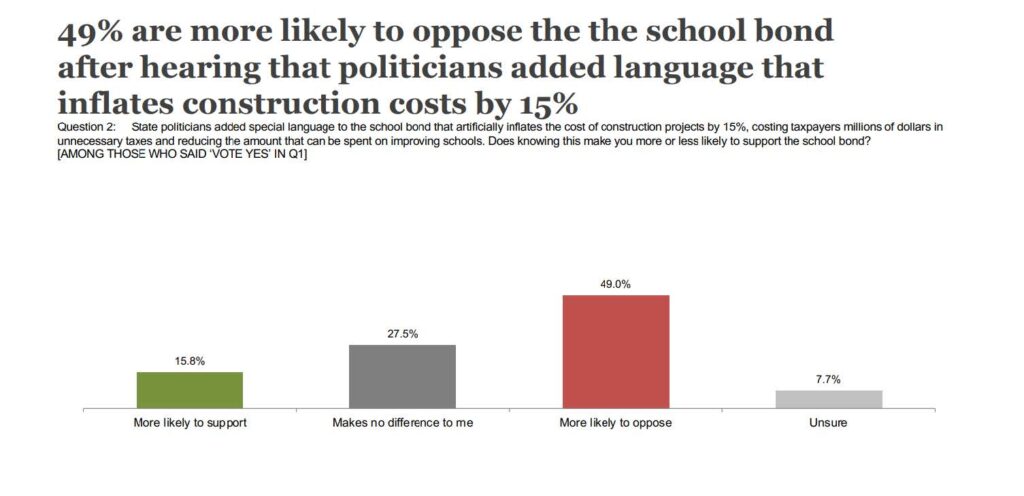
So, it is not surprising that the $10 billion dollar school construction bond will be restricted to benefit union labor, but what is surprising is that once the public learns about the cost and discrimination included, voters are 49% less likely to support the measure.
School bonds are a critical tool for keeping up with school facility needs and generating good-paying jobs for Californians. It’s a shame when there are legitimate facility issues throughout the state that elected officials are putting the bond’s ability to pass in jeopardy by playing favorites and politics.
Does this new polling on California’s Proposition 2 highlight the public’s growing distrust of the state to spend tax dollars fairly – even on popular projects like school construction?
That’s what construction industry experts are speculating after a California statewide poll was conducted last month by Probolsky Research to take the first test of the public’s attitude towards Prop. 2.
Proposition 2 is a $10 billion bond that would pay for repairs and upgrades at K-12 school and community college buildings across California. For political reasons, a provision was included to restrict the construction labor on the project to only politically connected labor unions. However, it ironically may be the same provisions that helped get the measure through the California Legislature and on the ballot that could be the thing that sinks Proposition 2 with California voters – a controversial Project Labor Agreement (PLA.)
This is a big problem for proponents of Prop. 2, because as the Probolsky Research poll shows, the Proposition is barely passing with less than 55% before voters learn anything about the discriminatory restrictions. And while the measure only needs 50% of voters to approve the bond, past Propositions have trended towards a “No” vote the closer we get to Election Day.
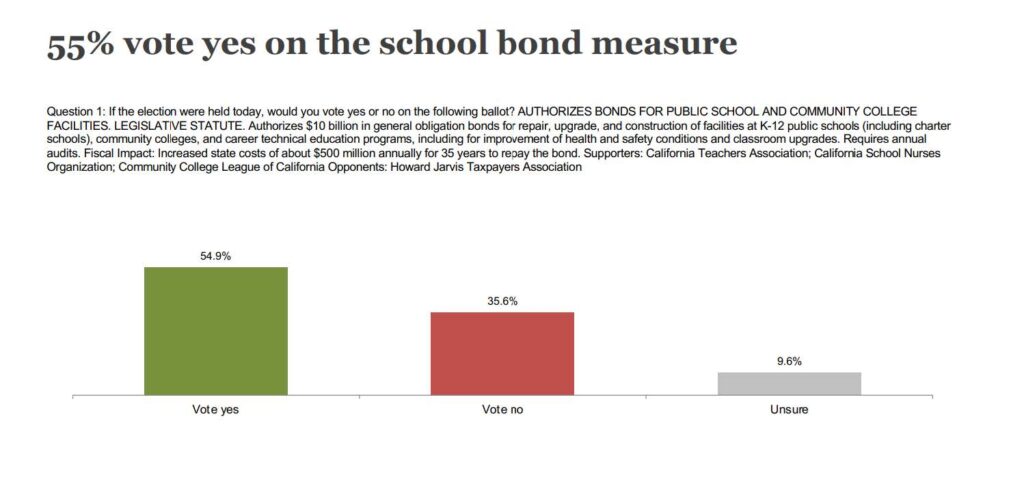
For example, support for Proposition 1 dropped 17-18% points in the last three months of the campaign earlier this year with almost no organized opposition effort.
According to the political website CalMatters.org, Prop. 1 (Gov. Gavin Newsom’s plan for a $6.4 billion bond for the construction of new treatment beds and housing,) started at 68% and dropped a week before the election in March polls to just 50%. Prop. 1 ended up passing by only 26,223 votes. (50.18 percent “Yes” votes versus 49.82 percent “No” votes.)
That is because as the Public Policy Institute of California director Mark DiCamillo wrote in an analysis of the Prop. 1 poll results, “Historically, most undecided voters in the late stages of a bond campaign tend to vote No.”
In fact, in 2020 California voters rejected a $15 billion school facilities bond. That bond also contained controversial PLA provisions similar to Prop. 2’s special interest deal for union construction. PLAs 1). restrict minority participation and 2). increase costs 13-15%. Each issue lost the “Yes on Prop. 2” side nearly half (49%) of their voters.
PLAs Restrict Participation By Black and Latino Construction Workers
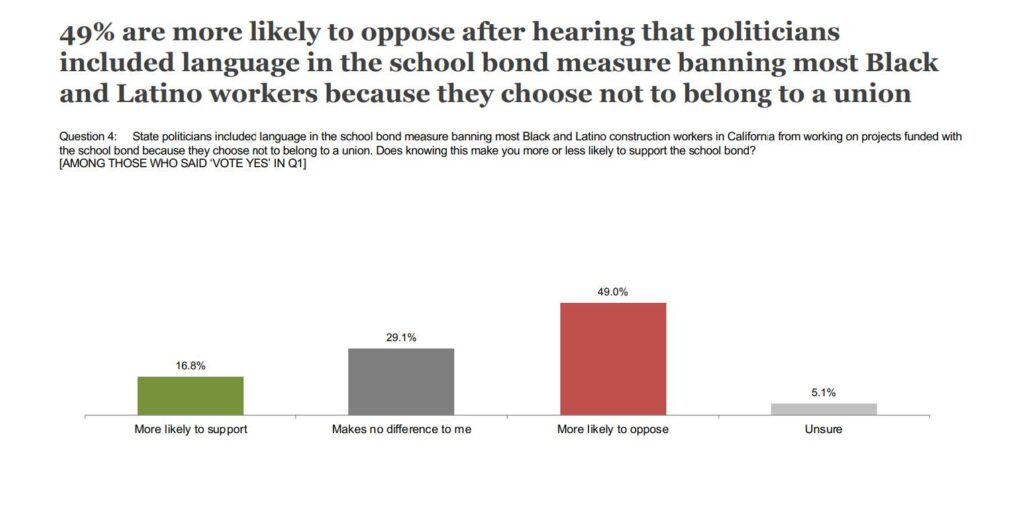
PLAs restrict participation by black and Latino construction workers because as Harry C. Alford, president of the National Black Chamber of Commerce said in an affidavit submitted in court, about 98% of black and Latino-owned construction companies are non-union.
The August 2024 Probolsky Research poll asked respondents, “State politicians included language in the school bond measure banning most Black and Latino construction workers in California from working on projects funded with the school bond because they choose not to belong to a union. Does knowing this make you more or less likely to support the school bond?” 49% are more likely to oppose after hearing that politicians included language in the school bond measure banning most Black and Latino workers because they choose not to belong to a union.
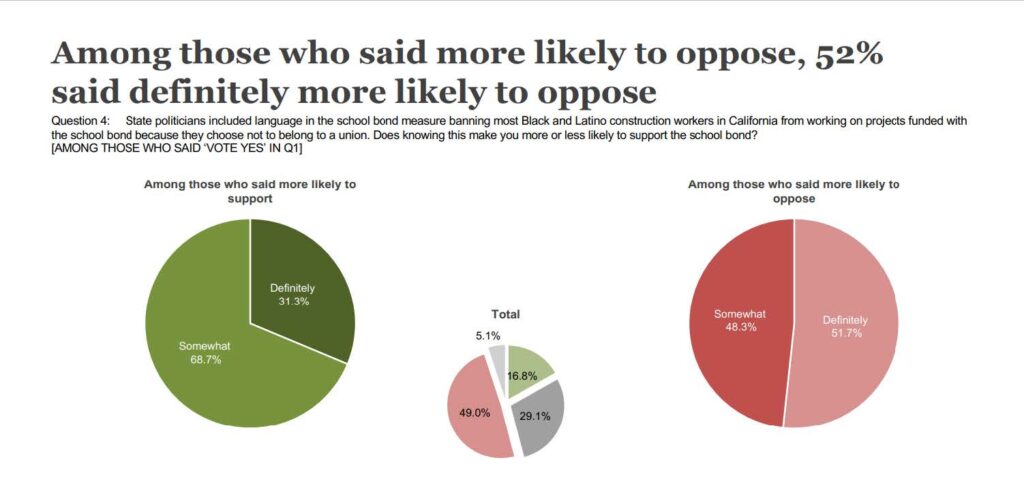
Among those who said they were more likely to oppose, 52% said they are definitely more likely to oppose.
PLAs Increase Costs For Taxpayers 13-15%.
PLAs increase costs for taxpayers 13-15% on average because Project Labor Agreements discriminate against the over 80% of construction workers that choose to work in a union-free environment. This means that PLAs discriminate against more than eight out of 10 construction workers.
Therefore, it is not surprising that Project Labor Agreements raise the cost of construction 13-15% on average. That will equal billions in lost taxpayer dollars due to higher bids and less bidders. When proponents claim that PLAs are open to union and nonunion contractors, they do not explain the details of how the 80% of construction workers who choose to work in a non-union environment will be forced to pay a number of additional costs under any Project Labor Agreement.
Merit shop workers are forced to pay into union healthcare programs that they are unable to use. Also, merit shop workers are forced to pay into union pension funds that they are unable to use, and pay fees that are equal to union dues – but they will get no membership or voting rights in the union. Because of these additional cost increases and many other discriminatory policies built into every Project Labor Agreement, you will see three or four bidders on projects that used to receive 25 or 30 bids on average. That results in a 13-15% increase in cost and taxpayers end up building four projects for the price of five.
The August 2024 Probolsky Research poll asked respondents this question, “State politicians added special language to the school bond that artificially inflates the cost of construction projects by 15%, costing taxpayers millions of dollars in unnecessary taxes and reducing the amount that can be spent on improving schools. Does knowing this make you more or less likely to support the school bond?” 49% are more likely to oppose the school bond after hearing that politicians added language that inflates construction costs by 15%.
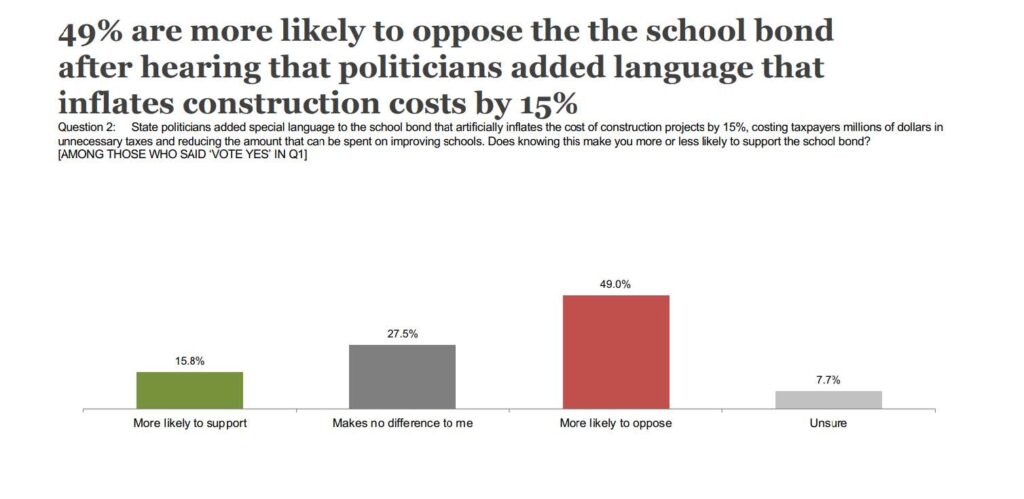
In conclusion, either of the two negative issues tested in the August 2024 California Statewide Voter Survey poll conducted by Probolsky Research would be enough to sink Proposition 2 – combined the two problems deal Prop. 2 a fatal blow. Support for Prop. 2 evaporates when voters learn of the waste and barriers to minority participation provisions included.
Worse yet, when compared to Prop.1, a similar measure that was put before voters earlier this year, Proposition 2 seems headed for defeat in November 2024. Proposition 1 dropped 18% points in the last three months before the election. Prop. 2 sits tenuously at 55%.
###
The Central Valley Business Federation (BizFed) is a dynamic alliance uniting 75+ businesses, 30,000 employers, and 400,000 employees. With high-level access to leaders, we foster dialogue, collaborate on solutions, and champion accountability. Together, we’re transforming the Central Valley, spurring growth, job creation, and driving policies for a stronger regional economy.
